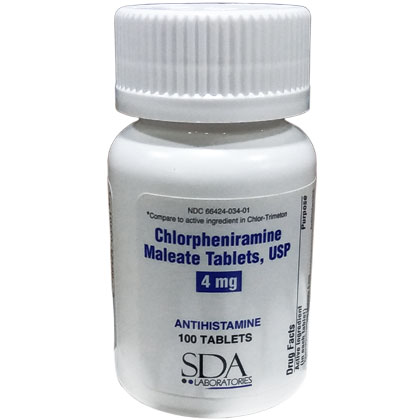Antihistamines are a type of medication that can temporarily block the effects of histamines in the body that are released in response to allergens.
Pets can have allergies to things that are inhaled like pollens, grasses, ragweed, trees, etc. This is called atopy.
Spring and summer are usually the worst months for cats with seasonal allergies, but especially July, August, and September.
In cats, allergies may show up as sneezing, coughing, wheezing or redness (inflammation) and hair loss on the ears, and pruritic (itchy) skin.
Even indoor cats are exposed to outdoor allergens. Every time somebody opens a door to enter or exit your home, (or to sign for a delivery or order Girl Scout cookies) some air gets in.
If your cat is affected by seasonal allergies, keep all windows shut during spring and summer.
Food allergies are different, as the method of treatment is to find out what specifically the cat is allergic to (usually this requires a 3 month food trial), and then to permanently remove the offending food ingredient from the cat’s diet.
Antihistamines will not treat food allergies.
Contact allergies:
Cats can be allergic to wool. If your cat is experiencing hair loss and lays on wool blankets, try taking the wool out of the house and see if that makes a difference.
Cats can be allergic to pine. If you use pine litter, try switching to a clumping clay litter.
How do you know if your cat has allergies? What if it’s not allergies, what if it’s something else?
There are so many different things cats can have that may cause your cat to show similar symptoms: feline herpes, asthma, hairballs, eosinophilic granuloma complex, rodent ulcers, ringworm, bug bites, external parasites, etc.
The real cause of the symptoms can only be determined by your veterinarian and in some cases a different type of medication may be required.
Diphenhydramine (Benadryl) is one that works well for dogs, but is the not best choice for cats.
Here are the 2 most effective over the counter antihistamines for cats.
Only give medications to your cat if instructed to by your veterinarian.
Antihistamines may interact with other medications, so they may not be appropriate for your cat.
Over the counter means a prescription is not required. Find these products in any pharmacy or grocery store, and also online.
Antihistamines may be suggested for cats in place of a heavy sedative for traveling, as a known side effect of antihistamines is drowsiness.
The dosing below is the same whether antihistamines are being used for allergies or traveling.
Chlorpheniramine maleate (Chlor-Trimeton) 4 mg tablets
Give ½ tablet by mouth every 12-24 hours.
Make sure that Chlorpheniramine maleate is the only active ingredient listed.
Cetirizine (Zyrtec) 10 mg tablets
Give 1/2 tablet by mouth every 12-24 hours.
Make sure that Cetirizine is the only active ingredient listed.
Check the price on Amazon here.


